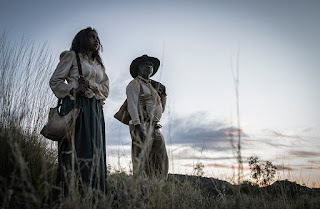Walking into the cinema...
Can we learn from our history?
Russelling Reviews: 3 stars
Within the dark interpretation of the Australian landscape, director Warwick Thornton manages to incorporate elements of biblical concepts that help to propel the story. With the confronting Samson & Delilah and with his latest release, Sweet Country, he paints a picture of the plight and hopelessness of the aboriginal experience but allows the light of the Bible to influence these worlds. The title of his original film is a precursor to the difficulties the central charters are to face, but in the most recent film he introduces one of the most appealing Christian characters in cinema this year, Fred Smith played brilliantly by Sam Neill.
This historical journey takes place in the early 1900s in Australia’s Northern Territory and begins when newcomer Harry March (Ewen Leslie) comes to Fred’s property to ask for assistance with his cattle yards. Naively, the landowner encourages his Aboriginal farmhand, Sam Kelly (Hamilton Morris) and his family to go and assist their new neighbour. Upon arrival to the property, the relationship between March and the Kelly's becomes strained and abusive, because of the cattle owner’s mental state. This mistreatment leads to a confrontation between the two men that culminates with March’s death. Even though this violent end was the result of self-defence, Sam and his wife go on the run into the outback. A hunting party is brought together by the local law enforcement by Sergeant Fletcher (Bryan Brown) to bring the Kelly’s to justice. As the details surrounding the cattleman's death are brought to light, the small community begins to question if the right people are held to account.
The violent realities of the history of the sunburned country and the treatment of indigenous Australians have been a central theme throughout this country’s cinematic past. What Thornton offers to this genre is blurred lines of who is to blame for the atrocities. He does not allow the ‘white fella’ to get away with this sordid past but does show that those within the Aboriginal community can be their own worst enemy. Even under the mistreatment placed upon them, they are confused on where to put their loyalty and turn on one another, as opposed to supporting those within their community.
The young indigenous director shows his background as a cinematographer by depicting both the beauty and unforgiving nature of the Australian landscape. The land becomes a metaphor for the people who inhabit it with some being relentless, but some showing the allure of the human experience. There is a beauty to the film, despite the ugliness of the events surrounding the killing. The relationship between Sam and Lizzie (Natassia Gorey Furber) has a sincere simplicity that does not require excessive dialogue. Complementing these performances is the winsome portrayal of Fred Smith by Neil who is allowed to be the conscience of the film. These fragments of charm are overwhelmed by the violence and desperate aspects of this historical account.
Sweet Country is compelling and is well crafted, but it is hard to enjoy the cinematic experience. The real value of this movie is to warn our society to keep from repeating its history and that we should do more to celebrate the beauty that Australia has provided.
REEL DIALOGUE: What are some of the bigger questions to consider from this film?
Watching the Kelly's travelling across the outback caused a deep feeling of being alone on this planet.
Are we alone on this journey called life? It is easy to even feel isolated in a crowd, much less while on the run from the authorities across the deserts of Australia. Isolation can be a physical reality, but for many it is truly a state of mind. We can seek out solace in personal relationships or through technology, but these things do eventually have limited satisfaction.
This deeply philosophical query can be answered by saying that God is there for us all. Mankind needs to merely turn around and acknowledge His presence. During times of joy or loneliness, God is there for us and provides a relationship unlike any other. Where do you start? Begin with the first book of the New Testament - Matthew 28:20 - ‘behold, I am with you always, to the end of the age’ and then go back to beginning of the story and introduce yourself the person of Jesus. Matthew
You never have to be alone again...
Trailer for the film




Comments
Post a Comment